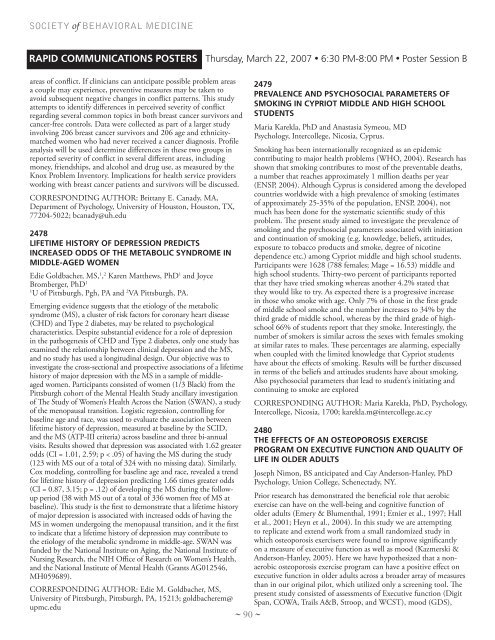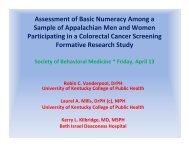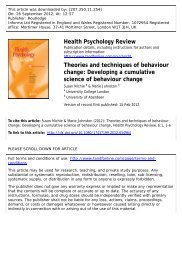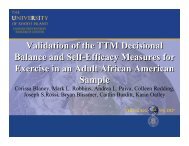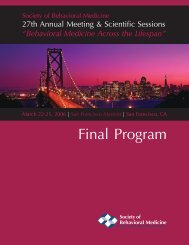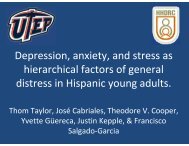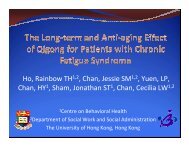2007 Final Program - Society of Behavioral Medicine
2007 Final Program - Society of Behavioral Medicine
2007 Final Program - Society of Behavioral Medicine
Create successful ePaper yourself
Turn your PDF publications into a flip-book with our unique Google optimized e-Paper software.
SOCIETY <strong>of</strong> BEHAVIORAL MEDICINE<br />
Rapid Communications Posters Thursday, March 22, <strong>2007</strong> • 6:30 PM-8:00 PM • Poster Session B<br />
areas <strong>of</strong> conflict. If clinicians can anticipate possible problem areas<br />
a couple may experience, preventive measures may be taken to<br />
avoid subsequent negative changes in conflict patterns. This study<br />
attempts to identify differences in perceived severity <strong>of</strong> conflict<br />
regarding several common topics in both breast cancer survivors and<br />
cancer-free controls. Data were collected as part <strong>of</strong> a larger study<br />
involving 206 breast cancer survivors and 206 age and ethnicitymatched<br />
women who had never received a cancer diagnosis. Pr<strong>of</strong>ile<br />
analysis will be used determine differences in these two groups in<br />
reported severity <strong>of</strong> conflict in several different areas, including<br />
money, friendships, and alcohol and drug use, as measured by the<br />
Knox Problem Inventory. Implications for health service providers<br />
working with breast cancer patients and survivors will be discussed.<br />
CORRESPONDING AUTHOR: Brittany E. Canady, MA,<br />
Department <strong>of</strong> Psychology, University <strong>of</strong> Houston, Houston, TX,<br />
77204-5022; bcanady@uh.edu<br />
2478<br />
LIFETIME HISTORY OF DEPRESSION PREDICTS<br />
INCREASED ODDS OF THE METABOLIC SYNDROME IN<br />
MIDDLE-AGED WOMEN<br />
Edie Goldbacher, MS, 1 , 2 Karen Matthews, PhD 1 and Joyce<br />
Bromberger, PhD 1<br />
1<br />
U <strong>of</strong> Pittsburgh, Pgh, PA and 2 VA Pittsburgh, PA.<br />
Emerging evidence suggests that the etiology <strong>of</strong> the metabolic<br />
syndrome (MS), a cluster <strong>of</strong> risk factors for coronary heart disease<br />
(CHD) and Type 2 diabetes, may be related to psychological<br />
characteristics. Despite substantial evidence for a role <strong>of</strong> depression<br />
in the pathogenesis <strong>of</strong> CHD and Type 2 diabetes, only one study has<br />
examined the relationship between clinical depression and the MS,<br />
and no study has used a longitudinal design. Our objective was to<br />
investigate the cross-sectional and prospective associations <strong>of</strong> a lifetime<br />
history <strong>of</strong> major depression with the MS in a sample <strong>of</strong> middleaged<br />
women. Participants consisted <strong>of</strong> women (1/3 Black) from the<br />
Pittsburgh cohort <strong>of</strong> the Mental Health Study ancillary investigation<br />
<strong>of</strong> The Study <strong>of</strong> Women’s Health Across the Nation (SWAN), a study<br />
<strong>of</strong> the menopausal transition. Logistic regression, controlling for<br />
baseline age and race, was used to evaluate the association between<br />
lifetime history <strong>of</strong> depression, measured at baseline by the SCID,<br />
and the MS (ATP-III criteria) across baseline and three bi-annual<br />
visits. Results showed that depression was associated with 1.62 greater<br />
odds (CI = 1.01, 2.59; p < .05) <strong>of</strong> having the MS during the study<br />
(123 with MS out <strong>of</strong> a total <strong>of</strong> 324 with no missing data). Similarly,<br />
Cox modeling, controlling for baseline age and race, revealed a trend<br />
for lifetime history <strong>of</strong> depression predicting 1.66 times greater odds<br />
(CI = 0.87, 3.15; p = .12) <strong>of</strong> developing the MS during the followup<br />
period (38 with MS out <strong>of</strong> a total <strong>of</strong> 336 women free <strong>of</strong> MS at<br />
baseline). This study is the first to demonstrate that a lifetime history<br />
<strong>of</strong> major depression is associated with increased odds <strong>of</strong> having the<br />
MS in women undergoing the menopausal transition, and it the first<br />
to indicate that a lifetime history <strong>of</strong> depression may contribute to<br />
the etiology <strong>of</strong> the metabolic syndrome in middle-age. SWAN was<br />
funded by the National Institute on Aging, the National Institute <strong>of</strong><br />
Nursing Research, the NIH Office <strong>of</strong> Research on Women’s Health,<br />
and the National Institute <strong>of</strong> Mental Health (Grants AG012546,<br />
MH059689).<br />
CORRESPONDING AUTHOR: Edie M. Goldbacher, MS,<br />
University <strong>of</strong> Pittsburgh, Pittsburgh, PA, 15213; goldbacherem@<br />
upmc.edu<br />
~ 90 ~<br />
2479<br />
PREVALENCE AND PSYCHOSOCIAL PARAMETERS OF<br />
SMOKING IN CYPRIOT MIDDLE AND HIGH SCHOOL<br />
STUDENTS<br />
Maria Karekla, PhD and Anastasia Symeou, MD<br />
Psychology, Intercollege, Nicosia, Cyprus.<br />
Smoking has been internationally recognized as an epidemic<br />
contributing to major health problems (WHO, 2004). Research has<br />
shown that smoking contributes to most <strong>of</strong> the preventable deaths,<br />
a number that reaches approximately 1 million deaths per year<br />
(ENSP, 2004). Although Cyprus is considered among the developed<br />
countries worldwide with a high prevalence <strong>of</strong> smoking (estimates<br />
<strong>of</strong> approximately 25-35% <strong>of</strong> the population, ENSP, 2004), not<br />
much has been done for the systematic scientific study <strong>of</strong> this<br />
problem. The present study aimed to investigate the prevalence <strong>of</strong><br />
smoking and the psychosocial parameters associated with initiation<br />
and continuation <strong>of</strong> smoking (e.g. knowledge, beliefs, attitudes,<br />
exposure to tobacco products and smoke, degree <strong>of</strong> nicotine<br />
dependence etc.) among Cypriot middle and high school students.<br />
Participants were 1628 (788 females; Mage = 16.53) middle and<br />
high school students. Thirty-two percent <strong>of</strong> participants reported<br />
that they have tried smoking whereas another 4.2% stated that<br />
they would like to try. As expected there is a progressive increase<br />
in those who smoke with age. Only 7% <strong>of</strong> those in the first grade<br />
<strong>of</strong> middle school smoke and the number increases to 34% by the<br />
third grade <strong>of</strong> middle school, whereas by the third grade <strong>of</strong> highschool<br />
66% <strong>of</strong> students report that they smoke. Interestingly, the<br />
number <strong>of</strong> smokers is similar across the sexes with females smoking<br />
at similar rates to males. These percentages are alarming, especially<br />
when coupled with the limited knowledge that Cypriot students<br />
have about the effects <strong>of</strong> smoking. Results will be further discussed<br />
in terms <strong>of</strong> the beliefs and attitudes students have about smoking.<br />
Also psychosocial parameters that lead to student’s initiating and<br />
continuing to smoke are explored<br />
CORRESPONDING AUTHOR: Maria Karekla, PhD, Psychology,<br />
Intercollege, Nicosia, 1700; karekla.m@intercollege.ac.cy<br />
2480<br />
THE EFFECTS OF AN OSTEOPOROSIS EXERCISE<br />
PROGRAM ON EXECUTIVE FUNCTION AND QUALITY OF<br />
LIFE IN OLDER ADULTS<br />
Joseph Nimon, BS anticipated and Cay Anderson-Hanley, PhD<br />
Psychology, Union College, Schenectady, NY.<br />
Prior research has demonstrated the beneficial role that aerobic<br />
exercise can have on the well-being and cognitive function <strong>of</strong><br />
older adults (Emery & Blumenthal, 1991; Etnier et al., 1997; Hall<br />
et al., 2001; Heyn et al., 2004). In this study we are attempting<br />
to replicate and extend work from a small randomized study in<br />
which osteoporosis exercisers were found to improve significantly<br />
on a measure <strong>of</strong> executive function as well as mood (Kazmerski &<br />
Anderson-Hanley, 2005). Here we have hypothesized that a nonaerobic<br />
osteoporosis exercise program can have a positive effect on<br />
executive function in older adults across a broader array <strong>of</strong> measures<br />
than in our original pilot, which utilized only a screening tool. The<br />
present study consisted <strong>of</strong> assessments <strong>of</strong> Executive function (Digit<br />
Span, COWA, Trails A&B, Stroop, and WCST), mood (GDS),


